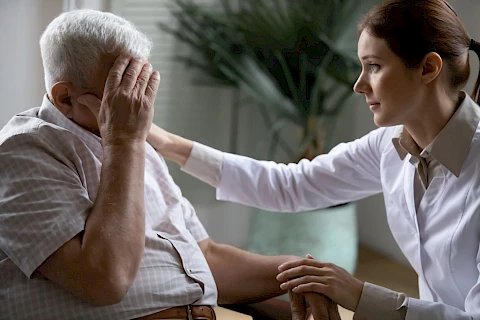
As we navigate the heartrending journey of grief, understanding, and companionship become vital lifelines. This is especially true for seniors who've recently lost their spouses. As caregivers, whether you're a family member or a professional, it's important to understand their emotional, physical, and mental health needs during such a challenging time.
Today we'll take a frank look at typical grief behaviors in seniors, explore ways to show empathy and support, and discuss the common health ramifications that seniors may face after losing their spouse.
The Effects of Grief
Grief is a complex process that can manifest differently from person to person. Seniors dealing with loss may show signs of sadness, withdraw from social activities, or even express anger or guilt. Regular changes in mood, sleep, and eating habits might also be symptoms of grief. It's important to note that these are natural responses to loss, though they should be monitored; if the symptoms don't subside, it may be necessary to seek the help of a healthcare provider.
Showing Empathy and Support as a Caregiver
As a caregiver, being patient and present can make a world of difference to a grieving senior.
Empathy goes beyond words of comfort or supportive gestures. It's about validating their emotions, acknowledging their pain, and listening when they need to share their memories.
Encourage them to express their feelings. Maintain regular contact, and offer assistance in handling practical matters like financial paperwork or funeral arrangements.
Health Ramifications for Seniors After Losing a Spouse
The loss of a spouse can carry significant health ramifications for seniors. Physically, they may experience changes in appetite and sleep patterns, lowered immune response, or unexplained aches and pains.
Mental health is also at risk. Grieving seniors are at a high risk of developing depression or anxiety. As a caregiver, you should encourage regular medical check-ups and keep an eye out for signs of deteriorating mental wellness. Early intervention can make a major difference in a senior's journey towards healing.
The Professional Caregiver's Role in Supporting Grieving Seniors
Professional caregivers can prove invaluable during this challenging time. Trained in handling grief and bereavement, they can provide emotional support, assist in maintaining a routine, and provide companionship to help alleviate feelings of loneliness and isolation. They also provide respite services so family caregivers can look after themselves. After all, they may be grieving too.
We're Here When You Need Us
Losing a spouse is an incredibly difficult experience that can have significant impacts on a senior's overall well-being. Whether we're family members or professional caregivers, understanding and supporting grieving seniors is vital.
At Senior Helpers Westchester County, our in-home caregivers provide specialized, compassionate care to seniors, helping them navigate their loss in a safe, familiar, and comforting environment. With our skilled care, seniors don't have to face this difficult journey alone—and neither do their caregiving relatives or friends.
If you or your grieving loved one lives in Scarsdale, Port Chester, Mount Kisco, White Plains, or anywhere in Westchester County, contact us at Senior Helpers Westchester County to learn more.